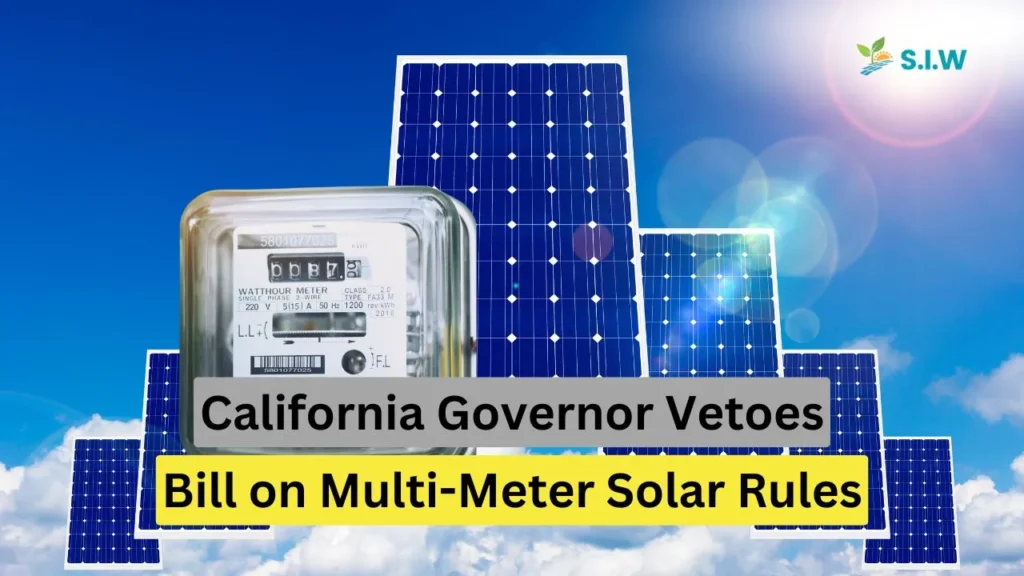Governor Gavin Newsom has vetoed a crucial bill (SB 1374) aimed at reversing a controversial decision by the California Public Utilities Commission (CPUC). This decision impacts schools, apartment buildings, and other multi-meter properties by limiting their ability to benefit from solar energy installations. Let’s explore what this veto means for California’s solar future and why it’s causing a stir among advocates.
What Is SB 1374 and Why Was It Introduced?
SB 1374, authored by State Senator Josh Becker, sought to restore the ability of properties with multiple electric meters (such as schools and apartment complexes) to use solar energy generated on-site. Previously, these properties could offset their electricity bills by using the solar power generated on one part of the property for other buildings, but the CPUC’s 2023 decision forced them to sell the power to the grid at low rates and buy back at much higher costs.
The bill aimed to change this, allowing schools and other similar properties to enjoy the same benefits that single-family homes do from solar energy, including lowering electricity costs and reducing reliance on the utility grid.
The CPUC’s Decision and Its Impact on Solar Energy
In November 2023, the CPUC ruled that multi-meter properties must sell all their solar power to the grid and cannot use it to offset their electricity consumption directly. This decision created a significant financial burden for schools and other properties that had planned to save on energy costs through solar installations.
The CPUC’s argument is that allowing schools and other multi-meter customers to benefit from solar energy in this way would cause a “cost shift” — essentially raising electricity costs for non-solar customers. The utilities claim this move protects non-solar customers from subsidizing those who generate their own power.
Why Did Governor Newsom Veto SB 1374?
Governor Newsom’s decision to veto the bill centers around concerns about electric bill affordability. He argued that allowing multi-meter properties like schools to benefit from solar energy would result in higher rates for other customers. According to Newsom, the bill would exacerbate the problem of “cost shifts” that could harm non-solar customers.
The governor’s decision has drawn sharp criticism from solar advocates, school districts, and environmental groups. They argue that the veto stifles solar adoption, particularly in public institutions like schools, which could greatly benefit from energy savings and sustainability improvements.
The Reaction from Solar Advocates and Lawmakers
Advocates for solar energy, including clean energy groups, farming organizations, and school districts, have expressed deep disappointment over the veto. Many argue that this decision discourages the expansion of solar energy, which is critical for reducing greenhouse gas emissions and combating climate change.
State Senator Josh Becker stated that the veto was a missed opportunity to support clean energy in schools and apartments, noting that California should be encouraging solar adoption rather than creating barriers.
The Future of Solar Energy in California
With this veto, California’s solar industry faces a more uncertain future. The CPUC’s recent rulings, combined with this latest veto, have already caused a sharp decline in rooftop solar installations. Solar advocates fear that without legislative changes, schools and other large institutions will be disincentivized from adopting solar energy, limiting the state’s potential to generate clean power.
However, proponents of SB 1374 have not given up. They continue to push for policies that make solar energy more accessible to schools and multi-meter properties. Whether future legislative efforts will succeed remains to be seen, but this issue is sure to remain a hot topic in California’s renewable energy debate.
Final Thoughts
Governor Newsom’s veto of SB 1374 highlights the ongoing tension between promoting solar energy and addressing concerns about electric bill affordability. While the governor and utilities argue that the current rules protect non-solar customers, advocates believe they are stifling progress toward a cleaner energy future.
With the state legislature unable to override the veto until the next session, the fate of solar energy in California’s schools and apartment buildings hangs in the balance. One thing is clear: the debate over how best to support solar power in the state is far from over(








